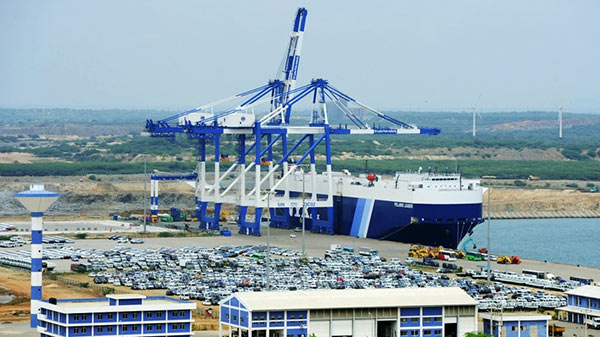Does China harbour strategic ambitions for Sri Lankan port?

Sri Lanka says it’s a way for it to help claw its way out of debt. China says it’s a strictly commercial deal for one of its state firms.
But analysts say the Hambantota port on the southern tip of Sri Lanka is part of Beijing’s bigger push to challenge US naval dominance in the Indian Ocean and New Delhi’s influence in the region.
Last month state-owned China Merchants Port paid US$1.12 billion to the Sri Lankan government for a 70 per cent stake in the facility.
The deal covers an area roughly twice the size of Macau and includes plans to develop a neighbouring industrial zone.
China Merchants said the facility would be developed into “a major industrial and service port”.
It’s the second time China has bought into a Sri Lankan port – it took an 85 per cent stake in the Port of Colombo on the country’s west coast in 2013.
Chinese interests have also bought into other harbour projects in Myanmar, Pakistan and Sudan, raising speculation that Beijing aims to establish a series of bases, or “string of pearls”, from the Middle East to China, containing India’s reach.
China has already established one such base in Djibouti in the Horn of Africa, although Beijing refers to it as a logistics facility.
The deal comes as India and China are locked in a tense stand-off in a contested area of the Himalayas. Beijing is also trying to expand its presence in India’s backyard, with a visit by Vice-Premier Wang Yang to Nepal later this month.
Colombo, which has strong traditional and cultural ties with India, has rejected claims that China will use the Hambantota port for strategic purposes.
“We told China that we can’t allow the port for military use and that 100 per cent responsibility of security matters should be with the Sri Lankan government,” Sri Lankan Ports and Shipping Minister Mahinda Samarasinghe told Reuters in last month.
Nevertheless, Beijing will undoubtedly project its military power as its economic interests grow, according to Li Li, a Southeast Asia researcher from the China Institutes of Contemporary International Relations.
“As China emerges as a great economic power on the world stage, it’s foreseeable that it will deploy military power to protect the country’s interests,” Li said.
“It will certainly not be about fighting wars, but China will see if there is a need for military protection over the Indian Ocean.
“We will need time to observe how closely Sri Lanka maintains its relations with both India and China, and ultimately how it prioritises their interests.”
Madhav Das Nalapat, director of the department of geopolitics and international relations at Manipal University, agreed the Hambantota deal had security implications but said it was more of a concern for the United States than for India.
“The port, when fully developed, will affect the present US dominance in the Indian Ocean. China is becoming a player in the Indian Ocean, not just at the tip of South Asia but in the Persian Gulf as well, and this is a challenge to the US,” Nalapat said.
But Professor Wang Dehua, from the Shanghai Municipal Centre for International Studies, said the international community was speculating too much about China’s military ambitions.
“The major objective of the deal is to prepare for an increase in China’s maritime trade,” Wang said.
China already ships more than 80 per cent of its oil imports from the Middle East through the Strait of Malacca, a waterway that runs between Indonesia, Malaysia and Singapore, and links the Indian Ocean and the South China Sea.
“With the Hambantota port, China could have an alternative route or station for its vessels in the Indian Ocean,” Wang said.
(Source: South China Morning Post)
Latest Headlines in Sri Lanka
- Mervyn Silva remanded until March 17, 2025 March 6, 2025
- Sri Lanka Police seek public help to locate former IGP Deshabandu Tennakoon March 6, 2025
- Audit reveals Sri Lanka paid Rs. 3 Billion extra for Indian buses March 6, 2025
- Sri Lanka President calls for tougher action on tax collection March 6, 2025
- Former Minister Mervyn Silva arrested by CID March 6, 2025


